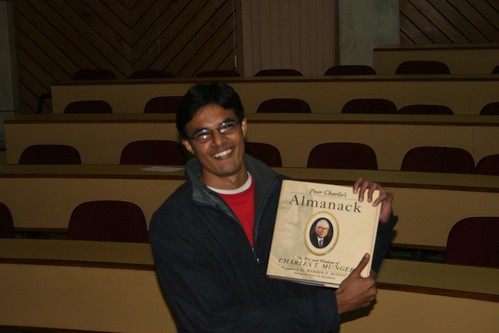Argumentative Conscience
“Miracles do not happen in contradiction to nature, but only in contradiction to that which is known to us in nature”–St. Augustine
Similarly, Successful people do not have anything in contradiction, to what every human being is blessed with, but to the extent that they make the most purposeful use of what is given.
Every action of ours is influenced by 2 faculties – our thoughts & our feelings. What abridges these 2 faculties is the ‘argumentative conscience’. It is this conscience that determines the course of our action and, in effect, its rationality. This whole process is made complex by what we call as ‘emotion’ and terminated by leaving everything upon ‘fate.’ On fate, this quote by Thomas Jefferson seems most appropriate to me
“The more hard work I do, the more lucky I get.”
I shall try to simplify this complexity by rationalizing the causes and effects of the same.
Causes:
“Heart has its reasons, that reasons don’t understand” – Pascal.
This quote by Pascal, I feel, highlights the most vicious and most common cause of this complexity (i.e.) when what we feel is in contradiction to what we think.
Example: People know they should not smoke; yet they smoke.
What causes this disparity between our feelings and thoughts is the domination of our ‘emotion’ over our ‘intelligence.’ Just as an argument won by force is ‘fallible,’ emotion taking over intelligence is ‘irrational.’
Effect:
“The worst enemy of investor (man) is he himself” – Ben Graham.
The most common effect of this contradiction is ‘illusion.’ Example: Many people are ready to believe that Duryodhana walked on water, but may not accept that sun is star.
In short, the most common effect is ‘Faith becomes the shortcut for knowledge.’
Inner Discipline:
When we try to win this argument, instead, by rationalizing the disparity, we do justice to both our thoughts and feelings. Because in this fair battle, it is the action that is the winner. The neutral judge who helps decide is the argumentative conscience and the rule that governs it is ‘Inner discipline.’
The argumentative nature of our conscience is not realized because of the instinctive nature of our brain. This is often termed as instinct, hunch and very often as sub-conscious mind. This is where ‘inner discipline’ can play a pivotal role. Intellect governs our thought process and perception governs our emotions. So we can in effect develop a right inner discipline by providing our brain with appropriate intellect and our heart with rational perception about our intellect and its need.
Conclusion:
Just as a mother cares of her child, we should feel blessed that we have 2 faculties – thoughts & feelings, which may or may not agree upon common course, but work towards a common cause of taking care of prospective actions. It took me two pages to explain what Warren Buffett did in a line,
“Only when you combine good intellect with emotional discipline, you get a rational behavior.”
Similarly, Successful people do not have anything in contradiction, to what every human being is blessed with, but to the extent that they make the most purposeful use of what is given.
Every action of ours is influenced by 2 faculties – our thoughts & our feelings. What abridges these 2 faculties is the ‘argumentative conscience’. It is this conscience that determines the course of our action and, in effect, its rationality. This whole process is made complex by what we call as ‘emotion’ and terminated by leaving everything upon ‘fate.’ On fate, this quote by Thomas Jefferson seems most appropriate to me
“The more hard work I do, the more lucky I get.”
I shall try to simplify this complexity by rationalizing the causes and effects of the same.
Causes:
“Heart has its reasons, that reasons don’t understand” – Pascal.
This quote by Pascal, I feel, highlights the most vicious and most common cause of this complexity (i.e.) when what we feel is in contradiction to what we think.
Example: People know they should not smoke; yet they smoke.
What causes this disparity between our feelings and thoughts is the domination of our ‘emotion’ over our ‘intelligence.’ Just as an argument won by force is ‘fallible,’ emotion taking over intelligence is ‘irrational.’
Effect:
“The worst enemy of investor (man) is he himself” – Ben Graham.
The most common effect of this contradiction is ‘illusion.’ Example: Many people are ready to believe that Duryodhana walked on water, but may not accept that sun is star.
In short, the most common effect is ‘Faith becomes the shortcut for knowledge.’
Inner Discipline:
When we try to win this argument, instead, by rationalizing the disparity, we do justice to both our thoughts and feelings. Because in this fair battle, it is the action that is the winner. The neutral judge who helps decide is the argumentative conscience and the rule that governs it is ‘Inner discipline.’
The argumentative nature of our conscience is not realized because of the instinctive nature of our brain. This is often termed as instinct, hunch and very often as sub-conscious mind. This is where ‘inner discipline’ can play a pivotal role. Intellect governs our thought process and perception governs our emotions. So we can in effect develop a right inner discipline by providing our brain with appropriate intellect and our heart with rational perception about our intellect and its need.
Conclusion:
Just as a mother cares of her child, we should feel blessed that we have 2 faculties – thoughts & feelings, which may or may not agree upon common course, but work towards a common cause of taking care of prospective actions. It took me two pages to explain what Warren Buffett did in a line,
“Only when you combine good intellect with emotional discipline, you get a rational behavior.”


